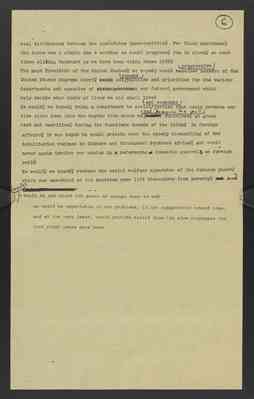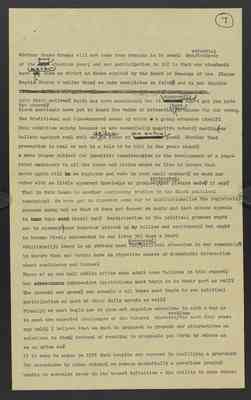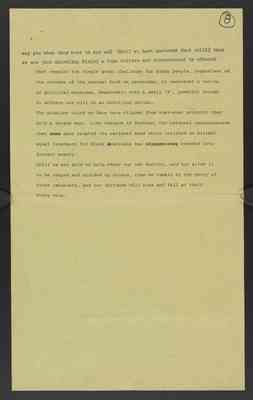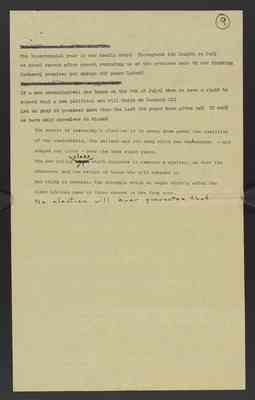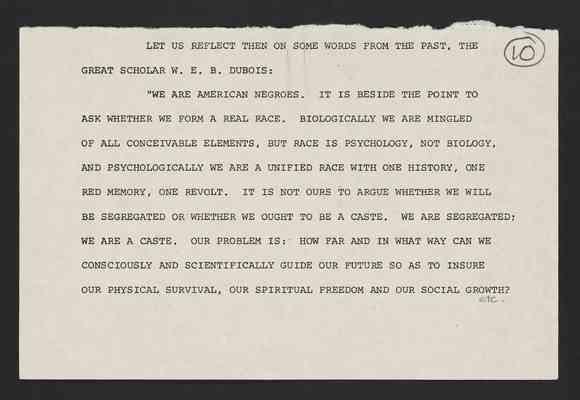Pages
6
6 real differences between the candidates imperceptible. For Black Americans, the issue was a simple one - whether we would progress, run in place, or continue sliding backward as we have been doing since 1968.
The next Presidnet of the United States, we hoped, would name progressive new members of the United States Supreme Court, would set humane policies and priorities for the various departments and agencies of [illegible] our federal government which help decide what kinds of lives we all shall live.
He would, we hoped, bring a commitment to social and economis justice that could reverse our slow slide down into the depths from which we pulled had begun to pull ourselves, at great cost and sacrifice, during the tumultuos decade of the 1960s. In foreign affairs, it was hoped he would preside over the speedy dismantling of the totalitarian regimes in Zimbawe and throughout Southern Africa, and would never agin involve our armies in a refereeing a dpmestic quarrels on foreign soil.
He would, we hoped, restore the social welfare apparatus of the Johnson years, which caw one-third of the American poor lift themselves from poverty, and and would begin to set right 200 years of wrongs done to us.
He would be empathetic to our problems, if not sympathetic toward them, and at the very least, would provide releif from the slow nightmare the last eight years have been.
7
7 Whether these dreams will now come true remains to be seen. Onepotential tragedy of the June Aug election year, and our participation in it, is that our standards have never been as strict as those appled by the Board of Deacons of the Plains Baptist Church - unlike them, we take candidates on faith, and do not inquire [whole line is illegible into their motives. Faith may move mountains, but it illegible] apparently won't get you into the church. Black Americans have yet to learn the value of extractin hard promises for our votes, the traditional and time-honored means by which a group advances itself. this condition exists because we are essentially negative voters, casting our ballots against real evil and seldom in favor of an actual good. Whether that preception is real or not is a tale to be told in the years ahead.
A more proper subject for immediate consideration is the development of a year-round machinery in all the towns and cities where we live to insure that never agin will in we register and vote in such small numbers, or cast our votes with so little apparent knowledge of promises extracted and pledges made, if any. That in turn leads to another continuing problem in the Black political community, We have got to discover some way to institutionalize the registratio[n] process among us, so that it does not depend on panic and last minute appeals to [illegible] turn [illegible itself out. Participation in the political process ought not be elevnth hour behavior stirred up by rallies and excitement, but ought to become firmly entrenched in our lives 365 days a year.
Additionally, there is an obvious need for increased political education in our community, to insure that our voters have an objective source of dependable information about candidates and issues.
Those of us who hold public office must admit some failures in this regard, but other [illegibe] independent institutions must begin to do their part as well. The church, our press, our schools - all these must begin to see political participation as part of their daily agenda as well.
Finally, we must begin now to plan and organize ourselves in such a way as to meet the expected challenges of the future. Whatever problems the next next four years may hold, I believe that we must be prepared to present our alternatives as solutions to then, instead of reacting ro proposals pur forth by others as we so often do.
It is easy to argue in 1976 that despite our success in qualifying a president for acceptance by other voters, we remain essentially a powerless people, unable to exercise power in its truest definition - the ability to make others
8
8 say yes when they want to say no. Until we have mastered that skill, then we are just whistling Dixie, a tune written and orchestrated by others.
That remains the single great challenge for Black people, regardless of the outcome of the contest held on yesterday, to construct a series of political machines, democratic with a small "d", powerful enough to enforce our will on an unwilling nation.
The problems which we face have slipped from what-ever priority they held a decade ago. Like changes in fashion, the national consciousness thar once once created the national mood which insisted on minimal equak treatnent for Black Americans has slipped away receded into distant memory.
Until we are able to help shape our own destiny, and not allow it to be shaped and moulded by others, then we remain at the mercy of other interests, and our fortunes will rise and fall at their every whim.
9
9 [whole line illegible]
The bicentennial year is now nearly over. Throughout its length so far, we heard speech after speech reminding us of the promises made by our founding fathers, promoses yet unkept 300 years later.
[whole line illegible]
If a new chronological era began on the 4th of July, then we have a right to expect that a new political era will begin on January 21.
Let us pray it promises more than the last 200 years have given us. If not, we have only ourselves to blame.
The result of yesterday's election is to sweep from power the coalition of comfortable, the callous and the smug which ran Washington - and shaped our lives - over the last eight years.
The new ruling [illegible]class replaces it remains a mystery, as does the character and the nature of those who will compose it.
One thing is certain: the struggle which we bagan shortly after the first African came to these shores is far from over.
No election will ever guarantee that.
10
10
Let us reflect then on some words from the past, the great scholar W. E. B. Dubois:
"We are American negroes. It is beside the point to ask whether we form a real race. Biologically we are mingled of all conceivable elements, but race is pyschology, not biology, and psychologically we are a unified race with one history, one red memory, one revolt. It is not ours to argue whether we will be segregated or whether we ought to be a caste. We are segregated; we are a caste. Our problem is: how far and in what way can we consciously and scientifically guide our future so as to insure our physical survival, our spiritual freedom and our social growth? etc.
